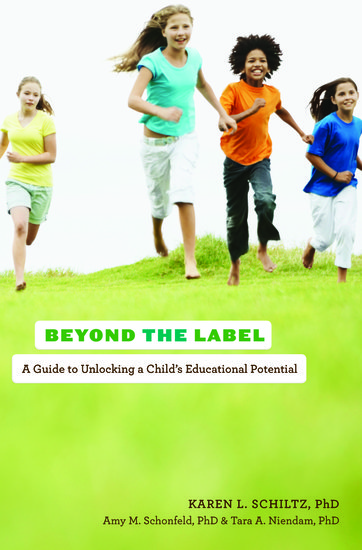By Karen L. Schiltz, Ph.D.
“My child will be starting school in two weeks. I can’t believe summer is almost over. I’m beginning to worry. Ellie still has trouble reading simple words and she does not like to read. I had problems with reading at her age. I wonder if I should wait till December to have her assessed or do it right now.”
“Katie’s teacher raised a flag last year. Katie will be in the third grade in a few weeks. I think she has a problem with reading and attention.”
Getting ready to go back to school can be a challenge. It is even more of a challenge when you suspect something is not quite right with your child. As parents, we do not want our child to have problems. We deeply want our child to be o.k. in everyday life. When our child suffers, we suffer as well.
What Ellie and Katie’s parents do not know is that their children are at risk for dyslexia. Dyslexia refers to “unexpected” difficulty in learning to read. In other words, reading fails to develop in the child despite their intelligence, education, motivation, and exposure to reading instruction in school. By the end of kindergarten, a child should be naming the letters of the alphabet, writing letters of the alphabet, learning that letters are associated with sounds, and even decoding simple sight words. A child should be reading and spelling words correctly at their grade level in first grade. Unfortunately, many parents tell me that their child will grow out of the problem. In fact, Katie’s father also acknowledged he had problems with reading. Ellie is voicing much frustration because reading words is difficult. Reading clearly isn’t fun. At the same time, Ellie’s mother thinks it is the lack of structure in the classroom that is causing the problem.
As parents, we need to trust our gut when things are a little off. The keys to recognizing a possible disorder could exist are the frequency, intensity, and pervasiveness of the behaviors:
- Frequency: How often is your child exhibiting these behaviors?
- Intensity: How severe are the behaviors compared to that of other children their age?
- Pervasiveness: Are the behavior(s) occurring in many situations? For example, are the behaviors exhibited during classroom instruction, tests, and homework time?
What are some of the warning signs when a child is exhibiting troubles with reading in kindergarten? You may notice the following challenges:
- Pronouncing words
- Reciting popular nursery rhymes
- Recalling the names of letters
- Recognizing the names of letters
- Recognizing common sight words
- Voicing frustration when sounding out simple words
- Sustaining attention and concentration when reading a story or when you are reading a story
You and the teachers may also recognize the following warning signs in elementary school:
- Relies on memorizing words
- Rushes and substitutes words when reading
- Problems spelling words
- No problems understanding text when read to orally
- Voices frustration and complains of fatigue when reading
- Complains about rereading material
- Problems remembering what was read
- Difficulty completing tests and in-class work on time
- Dreads reading in front of the class
- Stumbles over words and has trouble thinking of the right word when conversing with others
Early intervention is the key to unlocking the reading process for the child before frustration and anger sets in. A child’s reading problem must be addressed as soon as possible because the research indicates the younger child will react more positively to the reading intervention. Kindergarten and first grade are critical points as most long-term problems with reading can be prevented. We know that approximately 95 percent of children who have difficulties in reading can reach grade level if they are helped within the first two years of elementary school. Unfortunately, the gap between struggling readers and typical readers widens after the second grade. As a result, it is more difficult to remediate a reading problem once a child falls behind.
Ellie and Katie’s parents initially sought help from their pediatrician. Their physical, vision, and hearing examinations were normal. Their second step was to consult with me, a neuropsychologist. I told Ellie’s parents that their daughter lacked the ability to distinguish sounds within words and syllables. Ellie had trouble processing the sounds of speech, called phonemes. Katie’s father was told his daughter struggled when blending sounds together and she had problems sounding out unfamiliar words. She also exhibited problems with attention, which made reading even more difficult. I suggested help from a reading specialist. The parents learned there were many reading programs that were evidence-based (programs that work) and explicit and systematic in their approach. We know that both students will benefit from early intervention.
We can truly help our children if we intervene at an early age. Trust your gut if you think something is “a little off.” You know your child best of all. Voice your concerns to your child’s teacher and pediatrician. Remember: helping your child at a young age will save you and your child much frustration in the years to come.
Karen Schiltz is the co-author of Beyond The Label: A Guide to Unlocking a Child’s Educational Potential and Associate Clinical Professor (volunteer) at the Semel Institute for Neuroscience and Behavior at the University of California, Los Angeles. She has over 26 years of experience assessing children and young adults with developmental, medical, and emotional disorders and maintains a private practice in Calabasas, California. She blogs for Psychology Today at “Beyond the Label.”
Subscribe to the OUPblog via email or RSS.
Subscribe to only psychology articles on the OUPblog via email or RSS.
View more about this book on the ![]()
![]()




Recent Comments
There are currently no comments.